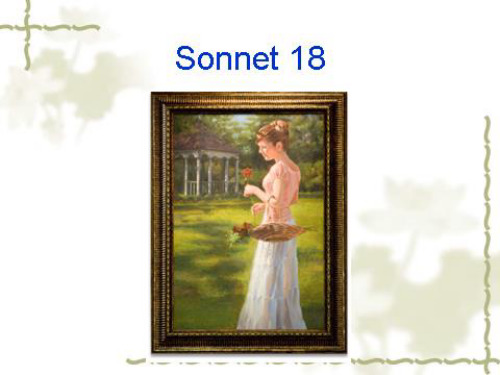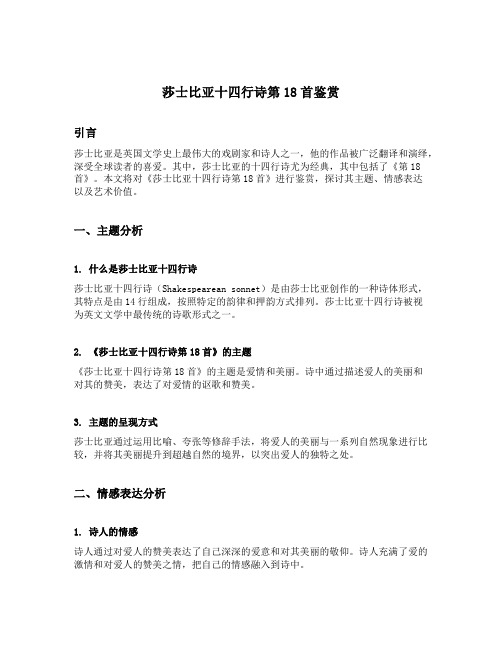sonnet 18 莎士比亚的作品《第十八行诗》赏析 英文版教学文稿
专八英国文学 莎士比亚 sonnet18

Sometime too hot the eye of heaven shines, c And often is his gold complexion dimm’d; d Elucidation (承) And every fair from fair sometime declines , c By chance, or nature’s changing course, untrimm’d. d But thy eternal summer shall not fade, Nor lose possession of that fair thou ow’st, Nor shall Death brag thou wander’st in his shade, When in eternal lines to time thou grow’st. So long as man can breathe or eyes can see, So long lives this, and this gives life to thee. e Transition f (转) e f
• So long as men can breathe or eyes can see, • So long live this, and this gives life to thee.
– this: this poem As long as there is man living in this world, as long as man’s eyes can see things, this poem will be eternal and it will also make you immortal.
But thy eternal summer shall not fade, 但是你的长夏永远不会雕落, Nor lose possession of that fair thou ow'st, 也不会损失你这皎洁的红芳, Nor shall death brag thou wand'rest in his shade, 或死神夸口你在他影里漂泊, When in eternal lines to time thou grow'st, 当你在不朽的诗里与时同长。 So long as men can breathe or eyes can see, 只要一天有人类,或人有眼睛, So long lives this, and this gives life to thee. 这诗将长存,并且赐给你生命。
专八英国文学 莎士比亚 sonnet18

Appreciation
• Shall I compare thee to a summer’s day? • Thou art more lovely and more temperate.
- a summer’s day: In England, summer is not hot but comfortably warm. It is the most pleasant season of the year. -temperate: gentle, soft, mild Paraphrase: How can I compare you to a summer’s day since you are lovelier and gentler than it?
But thy eternal summer shall not fade, 但是你的长夏永远不会雕落, Nor lose possession of that fair thou ow'st, 也不会损失你这皎洁的红芳, Nor shall death brag thou wand'rest in his shade, 或死神夸口你在他影里漂泊, When in eternal lines to time thou grow'st, 当你在不朽的诗里与时同长。 So long as men can breathe or eyes can see, 只要一天有人类,或人有眼睛, So long lives this, and this gives life to thee. 这诗将长存,并且赐给你生命。
Sometime too hot the eye of heaven shines, 天上的眼睛有时照得太酷烈, And often is his gold complexion dimmed, 它那炳耀的金颜又常遭掩蔽: And every fair from fair sometime declines, 被机缘或无常的天道所摧折, By chance, or nature's changing course untrimmed 没有芳艳不终于雕残或销毁。
十四行诗18英文赏析-莎士比亚[整理版]
![十四行诗18英文赏析-莎士比亚[整理版]](https://img.taocdn.com/s3/m/faf35c37bdd126fff705cc1755270722192e59c0.png)
莎士比亚的第18首十四行诗的英文赏析我能否将你比作夏天?你比夏天更美丽温婉。
狂风将五月的蓓蕾凋残,夏日的勾留何其短暂。
休恋那丽日当空,转眼会云雾迷蒙。
休叹那百花飘零,催折于无常的天命。
唯有你永恒的夏日常新,你的美貌亦毫发无损。
死神也无缘将你幽禁,你在我永恒的诗中长存。
只要世间尚有人吟诵我的诗篇,这诗就将不朽,永葆你的芳颜。
这首诗的艺术特点首先是在于它有着双重主题:一是赞美诗人爱友的美貌,二是歌颂了诗歌艺术的不朽力量。
其次就是诗人在诗中运用了新颖的比喻,但又自然而生动。
Sonnet 18, often alternately titled Shall I compare thee to a summer's day?, is one of the best-known of 154 sonnets written by the English playwright and poet William Shakespeare. Part of the Fair Y outh sequence (which comprises sonnets 1-126 in the accepted numbering stemming from the first edition in 1609), it is the first of the cycle after the opening sequence now described as the Procreation sonnets. Most scholars now agree that the original subject of the poem, the beloved to whom the poet is writing, is a male, though the poem is commonly used to describe a woman.In the sonnet, the poet compares his beloved to the summer season, and argues that his beloved is better. The poet also states that his beloved will live on forever through the words of the poem. Scholars have found parallels within the poem to Ovid's Tristia and Amores, both of which have love themes. Sonnet 18 is written in the typical Shakespearean sonnet form, having 14 lines of iambic pentameter ending in a rhymed couplet. Detailed exegeses have revealed several double meanings within the poem, giving it a greater depth of interpretation.Sonnet 18 is a typical English or Shakespearean sonnet. It consists of three quatrains followed by a couplet, and has the characteristic rhyme scheme: abab cdcd efef gg. The poem carries the meaning of an Italian or Petrarchan Sonnet. Petrarchan sonnets typically discussed the love and beauty of a beloved, often an unattainable love, but not always.[5] It also contains a volta, or shift in the poem's subject matter, beginning with the third quatrain.A facsimile of the original printing of Sonnet 18.The poem starts with a line of adoration to the beloved—"Shall I compare thee to a summer's day?" The speaker then goes on to say that the beloved being described is both "more lovely and more temperate" than a summer's day. Thespeaker lists some things that are negative about summer. It is too short—"summer's lease hath all too short a date"—and sometimes the sun shines too hot—"Sometime too hot the eye of heaven shines." However, the beloved being described has beauty that will last forever, unlike the fleeting beauty of a summer's day. By putting his love's beauty into the form of poetry, the poet is preserving it forever by the power of his written words. "So long as men can breathe, or eyes can see, So long lives this, and this gives life to thee." The hope is that the two lovers can live on, if not through children, then through the poems brought forth by their love which, unlike children, will not fadeA major feature of this poem - analogy. Begins with the first sentence, put "you" and "Summer" as a analogy, compare the second line of the initial determination: Are you more lovely than the summer, more gentle. The difference is due to produce its in-depth analysis of 3 to 14 lines. Specifically, the first line of 3.4.5.6.7.8 enumerated the "summer" all kinds of regrets, and 9.10.11.12.13.14 line tells the "you" all kinds of advantages compared to the natural draw a final conclusion: "Y ou" is far better than "Summer," "you" because in his poetry between the lines but also has a life, and time forever. Also noteworthy is the verse 13 and 14 are also, by analogy emphasized the "eternal nature."Throughout the poem, the poet freely to the "you" talk, it seems that "you" is a living person, to listen to his voice, understanding his thinking. So this poem can be said to be people in the application of techniques based on the written. The poem "Y ou" refers to an object, academia, there are two explanations, one view is that it refers to beauty, and the other that it refers to poetry to express the good things. Now most scholars prefer the latter.One of the best known of Shakespeare’s sonnets, Sonnet 18 is memorable for the skillful and varied presentation of subject matter, in which the poet’s feelings reach a level of rapture unseen in the previous sonnets. The poet here abandons his quest for the youth to have a child, and instead glories in the youth’s beauty.On the surface, the poem is simply a statement of praise about the beauty of the beloved; summer tends to unpleasant extremes of windiness and heat, but the beloved is always mild and temperate. Summer is incidentally personified as the "eye of heaven" with its "gold complexion"; the imagery throughout is simple and unaffected, with the "darling buds of May" giving way to the "eternal summer", which the speaker promises the beloved. The language, too, is comparatively unadorned for the sonnets; it is not heavy with alliteration or assonance, and nearly every line is its own self-contained clause--almost every line ends with some punctuation, which effects a pause.Initially, the poet poses a question―”Shall I compare thee to a summer’s day?”―and then reflects on it, remarking that the youth’s beauty far surpasses summer’s delights. The imagery is the very essence of simplic ity: “wind”and “buds.”In the fourth line, legal terminology―”summer’s lease”―is introduced in contrast to the commonplace images in the first three lines. Note also the poet’s use of extremes in the phrases “more lovely,”“all too short,”and “too hot”; these phrases emphasize the young man’s beauty.Although lines 9 through 12 are marked by a more expansive tone and deeper feeling, the poetreturns to the simplicity of the opening images. As one expects in Shakespeare’s sonnets, the proposition that the poet sets up in the first eight lines―that all nature is subject to imperfection―is now contrasted in these next four lines beginning with “But.”Although beauty naturally declines at some point―”And every fair from fair sometime declines”―the youth’s beauty will not; his unchanging appearance is atypical of nature’s steady progression. Even death is impotent against the youth’s beauty. Note the ambiguity in the phrase “eternal lines”: Are these “lines”the poet’s verses or the youth’s hoped-for children? Or are they simply wrinkles meant to represent the process of aging? Whatever the answer, the poet is jubilant in this sonnet because nothing threatens the young man’s beautiful appearance.Sonnet 18 is the first poem in the sonnets not to explicitly encourage the young man to have children. The "procreation" sequence of the first 17 sonnets ended with the speaker's realization that the young man might not need children to preserve his beauty; he could also live, the speaker writes at the end of Sonnet 17, "in my rhyme." Sonnet 18, then, is the first "rhyme"--the speaker's first attempt to preserve the young man's beauty for all time. An important theme of the sonnet (as it is an important theme throughout much of the sequence) is the power of the speaker's poem to defy time and last forever, carrying the beauty of the beloved down to future generations. The beloved's "eternal summer" shall not fade precisely because it is embodied in the sonnet: "So long as men can breathe or eyes can see," the speaker writes in the couplet, "So long lives this, and this gives life to thee."大多数莎学家认为,是作者赞美好友的超常之美的。
sonnet 18赏析

• 3. Man of superb intelligence, a close observer of men and manners, he easily sees through people. He could penetrate below the surface of things. He is forever.
h
12
The Tragedy of Hamlet, Prince of Denmark
• Hamlet is regarded as Shakespeare’s most popular and greatest play on the stage.
• Hamlet is also considered the summit of shakespeares art. The story comes from an old danish legend.
h
15
• To get ride of hamlet, claudius send him to england and sends assasins to kill him on the voyage. But hamlet succeeds in coming out of it alive and returns to denmark again.
莎士比亚十四行诗第18首鉴赏

莎士比亚十四行诗第18首鉴赏引言莎士比亚是英国文学史上最伟大的戏剧家和诗人之一,他的作品被广泛翻译和演绎,深受全球读者的喜爱。
其中,莎士比亚的十四行诗尤为经典,其中包括了《第18首》。
本文将对《莎士比亚十四行诗第18首》进行鉴赏,探讨其主题、情感表达以及艺术价值。
一、主题分析1. 什么是莎士比亚十四行诗莎士比亚十四行诗(Shakespearean sonnet)是由莎士比亚创作的一种诗体形式,其特点是由14行组成,按照特定的韵律和押韵方式排列。
莎士比亚十四行诗被视为英文文学中最传统的诗歌形式之一。
2. 《莎士比亚十四行诗第18首》的主题《莎士比亚十四行诗第18首》的主题是爱情和美丽。
诗中通过描述爱人的美丽和对其的赞美,表达了对爱情的讴歌和赞美。
3. 主题的呈现方式莎士比亚通过运用比喻、夸张等修辞手法,将爱人的美丽与一系列自然现象进行比较,并将其美丽提升到超越自然的境界,以突出爱人的独特之处。
二、情感表达分析1. 诗人的情感诗人通过对爱人的赞美表达了自己深深的爱意和对其美丽的敬仰。
诗人充满了爱的激情和对爱人的赞美之情,把自己的情感融入到诗中。
2. 诗中情感的转折《莎士比亚十四行诗第18首》中情感经历了由赞美到忧伤的转折。
在诗的前几行,诗人对爱人进行了赞美,表达了自己对其美丽的深深敬仰之情。
然而,在诗的后半部分,情感转向了忧伤,诗人担心时间的流逝会将爱人的美丽消逝,这种忧伤的情感为整首诗增添了深刻的情感色彩。
三、艺术价值分析1. 诗歌运用的修辞手法《莎士比亚十四行诗第18首》使用了丰富多样的修辞手法,比如比喻、夸张、对比等,这些修辞手法使整首诗充满了艺术魅力,具有很高的艺术价值。
2. 渲染的意境诗中通过对爱人美丽的描绘和对时间流逝的担忧,营造了一种诗意的意境。
诗人通过对自然现象的描绘,将爱人的美丽与大自然相较,突出了爱人的独特之处,同时也增加了诗歌的艺术感染力。
3. 对爱情的思考《莎士比亚十四行诗第18首》可以说是对爱情最美丽和深刻的思考之一。
William-Shakespeare-sonnet-18PPT课件

25
1) introduction to Shakespeare's Sonnets
• 154 sonnets:
• 1-126 addressed to a young man, beloved of the poet, of superior beauty and rank but of somewhat questionable morals and constancy
37 plays; divided into comedies, histories, and tragedies
12
The First Period(1590-1600):
The first period of Shakespeare’s dramatic composition was his apprenticeship in play writing.
20
• Which can be translated to;
• Good friend for Jesus sake forbear • To dig the dust enclosed here! • Blest be the man that spares these stones, • And curst be he that moves my bones.
莎士比亚sonnet18

被机缘或无常的天道所摧折, Shall I compare thee to a summer's day? By chance, or nature's changing course, 我怎么能够把你来比作夏天? untrimmed. Thou art more lovely and more temperate. 没有芳艳不终于雕残或销毁。 But thy eternal summer shall not fade, 你不独比它可爱也比它温婉。 Rough winds do shake the darling buds of May,但是你的长夏永远不会雕落, Nor lose possession of that fair thou owest; 狂风把五月宠爱的嫩蕊作践, 也不会损失你这皎洁的红芳; And summer's lease hath all too short a date; Nor shall Death brag thou wanderest in his shade, 夏天出赁的期限又未免太短; 或死神夸口你在他影里漂泊, Sometimes too hot the eye of heaven shines, When in eternal lines to time thou growest. 当你在不朽的诗里与时同长。 天上的眼睛有时照得太酷烈, So long as men can breathe or eyes can see, And often is his gold complexion dimmed; 只要一天有人类,或人有眼睛, 它那炳耀的金颜又常遭掩蔽; So long lives this, and this gives life to thee. 这诗将长存,并且赐给你生命。
sonnet 18

∨—∨—∨—∨—∨—a ∨—∨—∨—∨—∨—b ——∨—∨—∨—∨—a ∨—∨—∨—∨—∨—b ∨—∨—∨—∨—∨—c ∨—∨—∨—∨—∨—d ∨—∨—∨—∨—∨—c ∨—∨—∨—∨—∨—d ∨—∨—∨—∨—∨—e ∨—∨—∨∨∨—∨—f ∨∨——∨—∨∨∨—e ∨∨∨—∨—∨—∨—f ∨—∨—∨—∨—∨—g ∨—∨—∨—∨—∨—g
1 Addressed to a man or woman? 2 Shakespeare is gay? 3 The beauty of what?
Man’s Beauty
• What a piece of work is a man! How noble in reason! How infinite in faculty! in form, in moving, how express and admirable! in action how like an angel! in apprehension how like a god! the beauty of the world! the paragon of animals! And yet to me, what is this quintessence of dust? man delights not me; no, nor woman neither, though, by your smiling, you seem to say so. ----------William Shakespeare “Hamlet”
you Shall I compare thee to a summer’s day ?
能不能让我来把你比作夏日?
Thou art more lovely and more temperate:
- 1、下载文档前请自行甄别文档内容的完整性,平台不提供额外的编辑、内容补充、找答案等附加服务。
- 2、"仅部分预览"的文档,不可在线预览部分如存在完整性等问题,可反馈申请退款(可完整预览的文档不适用该条件!)。
- 3、如文档侵犯您的权益,请联系客服反馈,我们会尽快为您处理(人工客服工作时间:9:00-18:30)。
s o n n e t18莎士比亚的作品《第十八行诗》赏析英文版The speaker of the poem opens with a question that is addressed to the beloved, "Shall I compare thee to a summer's day?" This question is comparing her to the summer time of the year. It is during this time when the flowers are blooming, trees are full of leaves, the weather is warm, and it is generally thought of as an enjoyable time during the year. The following eleven lines in the poem are also dedicated to similar comparisons between the beloved and summer days. In lines 2 and 3, the speaker explains what mainly separates the young woman from the summer's day: she is "more lovely and more temperate." (Line 2) Summer's days tend toward extremes: they are sometimes shaken by "rough winds" (line3) which happens and is not always as welcoming as the woman. However in line 4, the speaker gives the feeling again that the summer months are often to short by saying, "And summer抯 lease hath tooshort a date." In the summer days, the sun, "the eye of heaven" (line 5), often shines "too hot," or too dim, "his gold complexion dimmed" (line 6), that is there are many hot days during the summer but soon the sun begins to set earlier at night because autumn is approaching. Summer is moving along too quickly for the speaker, its time here needs to be longer, and it also means that the chilling of autumn is coming upon us because the flowers will soon be withering, as "every fair from fair sometime declines." (Line 7) The final portion of the sonnet tells how the beloved differs from the summer in various respects. Her beauty will be one that lasts forever, "Thy eternal summer shall not fade." (Line 9), and never end or die. In the couplet at the bottom, the speaker explains how that the beloved's beauty will accomplish this everlasting life unlike a summer. And it is because her beauty is kept alive in this poem, which will last forever. It will live "as long as men can breathe or eyes can see." (Line 13)On the surface, the poem is on the surface simply a statement of praise about the beauty of the beloved woman and perhaps summer to the speaker is sometimes too unpleasant with the extremes of windiness and heat that go along with it. However, the beloved in the poem is always mild and temperate by her nature and nothing at all like the summer. It is incidentally brought to life as being described as the "eye of heaven" with its "gold complexion". The imagery throughout the sonnet is simple and attainable to the reader, which is a key factor in understanding the poem. Then the speaker begins to describe the summer again with the "darling buds of May" giving way to the " summer’s lease", springtime moving into the warmth of the summer. The speaker then starts to promise to talk about this beloved, that is so great and awing that she is to live forever in this sonnet. The beloved is so great that the speaker will even go as far as to say that, "So long as men breathe, or eyes can see," the woman will live. The language is almost too simple when comparing it to the rest of Shakespeare’s sonnets; it is not heavy with alliteration or verse, and nearly every line is its own self-contained clause, almost every line ends with some punctuation that effects a pause. But it is this that makes Sonnet18 stand out for the rest in the book. It is much more attainable to understand and it allows for the reader to fully understand how great this beloved truly is because she may live forever in it. An important theme of the sonnet, as it is an important theme throughout much of the poetry in general, is the power of the speaker's poem to defy time and last forever. And so by doing this itis then carrying the beauty of the beloved down to future generations and eventually for al of eternity. The beloved's "eternal summer" shall not fade precisely because it is embodied in the sonnet: "So long as men can breathe or eyes can see," (line 13) the speaker writes in the couplet, "So long lives this, and this gives life to thee."(Line 14) With this the speaker is able to accomplish what many have done in poetry and that is to give the gift of an eternal life to someone that they believe is special and outshines everyone else around them. Perhaps it is because of a physical beauty that the speaker see, but I believe that it is more because of the internal beauty as seen in line 2, "Thou art more lovely and more temperate", that the beloved is deserving to live on forever.。
